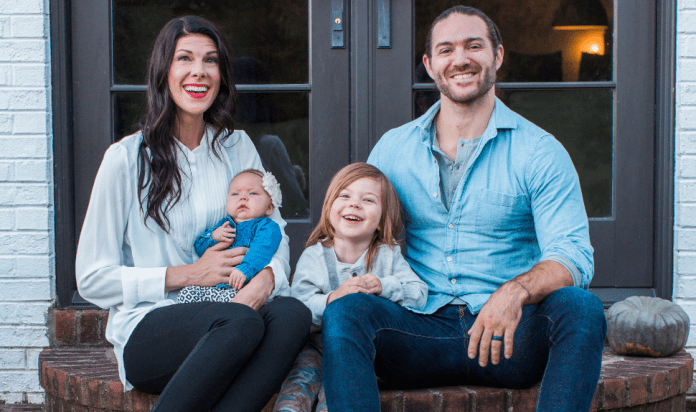By Christa Black Gifford
As my daughter Goldie’s heart beat for the last time on March 5, 2014, I felt her warm skin turn cold in my arms. Tears poured down my chin and onto her infant face, realizing I would never see her lips smile or feel her tiny hand reach up to touch my cheek—wailing at the truth that my daughter was gone, and there was nothing I could do to bring her back.
Luca Gold ‘Goldie’ Gifford was born with a condition called anencephaly where the top of her skull and brain didn’t develop, making her incompatible with life for very long outside of my womb. We had no idea there was anything wrong, giving us the shock of our lives the day she was born.
The summer months after Goldie’s death came and went, but my heart endured the harshest winter it had ever known—learning how to navigate the violent cold of grief that follows death. For months, our countertops stayed stocked with casseroles, pies, and flowers from friends and strangers, kindly reminding us that we weren’t alone or forgotten in our agony. Every gesture, big or small, felt like a faint glimmer of light in the middle of constant blackness. Meals and gifts were delivered with hugs and tears, and most were considerate of our heartache and graciously came and went quickly to avoid awkward moments of silence.
We didn’t have much energy for pleasantries. We didn’t have much energy for anything but breathing.
There were others, however, who were probably a bit like I was for many years, unaware of what to say or do when death crashed at close range. Instead of letting hugs, prayers, texts, gifts, and silent support do the talking, there were a few well meaning (and theologically inaccurate) comments we received that did anything but help.
In fact, they felt like punches to my broken heart that was already bleeding all over the place.
“God takes the best ones to be his angels, which is why he took Goldie.”
“Well, it must have been the will of God, honey.”
(While crying at Goldie’s memorial service) “God has COMMANDED you to be of good cheer. You can grieve later.”
“Romans 8:28 and James 1:2, girl! God’s gonna use this for good so consider it pure joy!”
“Oh Christa, don’t be sad! Don’t you know life is but a breath and death is not the end?”
“God knew how many people would be healed and saved because of her death, so it’s why he chose to take her.”
And my personal favorite, “I totally know how you feel. My cat just died.”
When death comes and hits those around you, might I make a few suggestions? The fragility of a shattered heart in moments of loss should be treated as delicately as someone who endured a bomb blast. I would love to equip you to aid in someone’s healing, instead of accidentally kicking them while they’re down.
Don’t Try To Silver-Line A Raincloud
I call this approach the ‘at least’ smack.
“Well, Christa, at least you can still have other children.”
“At least you still have your son, Moses.”
“At least Goldie is in heaven and you’ll see her again”
The ‘at least’ comments are usually true. But they don’t bring back the dead.
The ‘at least’ smack forgets that the griever is sitting dead center inside a hurricane that isn’t letting up anytime soon. They forget that mourning isn’t a sprint—it’s a marathon—and that your shattered heart takes time and care to piece back together. ‘At least’ friends usually haven’t dealt with their own pain enough to handle yours, so they want to ‘fix you’ quickly to make themselves feel less uncomfortable around your discomfort.
If you’ve attempted to silver-line someone’s raincloud with an ‘at least’ statement, remember this: sympathy wants to fix a problem, but empathy sits down in the storm, offering a shoulder to anyone crying in the rain. Empathy doesn’t need to change a person; empathy wants to be close to those who weep for as long as they need the support. In times of loss, no one wants distant solutions for a future they can’t see, especially when their vision is consumed with their present pain. A grieving heart simply needs someone to love and accept them in their current moment of dark agony.
Don’t Speak On Behalf of God About Their Loss
If you feel the need to speak on behalf of God after a loss, please don’t talk about His will. It’s simply not the time.
Instead of talking about the will of God during times of death, the best thing to do is to remind the griever of His nature. Remind them that He’s the ultimate Comforter, and that He provided us a Comforter because He knew that pain hurts like hell and that we would mourn. Remind them that He’s the Healer, and the only one who can put their broken heart back together. Let them know that you might not have the answers they are looking for, but that the greatest Counselor lives inside, waiting to speak to any who ask and listen.
Remind them that the Redeemer and Restorer is camping out directly in the middle of their broken heart, ready to begin the relational journey of putting them back together again.
Don’t Use Scripture To Shame Their Heartache
Sadness is not weakness, nor is it wrong. Jesus wept in empathy with his friend Mary over the death of her brother Lazarus, even though he was about to raise him back to life. A part of my heart will always be sad that Goldie doesn’t get to experience life with us on this earth, and that is completely okay.
I had countless people quote Romans 8:28, as if the knowledge of God bringing something good out of my daughter’s death made her absence any less agonizing. I had several people quote James 1:2, encouraging me to “consider it pure joy, my brothers and sisters, when you face trials of many kinds.” (NIV)
Great scriptures, wrong timing.
Usually when scriptures like these are used close to death, they can feel very shaming of sadness and mourning. Instead, the scriptures that encouraged my heart displayed a God who wasn’t afraid of my pain, coming close as my rescuer to hold me in my blackest night.
Psalm 38:9 (TPT) “My tears are liquid words, and you can read all of them.”Psalm 34:18 (ESV) “The Lord is near to the brokenhearted and saves the crushed in spirit.”
Psalm 23:4 (MSG) “Even when the way goes through Death Valley, I’m not afraid when you walk at my side. Your trusty shepherd’s crook makes me feel secure.”
Using scripture to reiterate the goodness and kindness of God in deepest tragedy will draw someone closer to the heart of God—the very place for them to begin healing.
If you want to really help those who have suffered loss, send flowers and texts, leave gifts and meals on their front porch. Don’t expect anything from them for a while, having grace for their process of grieving for as long as it takes. Be a listening ear if they need one, being perfectly content that you don’t have all the answers, reminding them that the Comforter, Counselor, and Healer is just a breath away. Offer them your shoulder to cry on as long as they need you.
And remember, the best thing you can say in times of loss is simply this:
“Truly, I am so, so, so sorry for your loss. And I am here to help however you need me.”
Christa Black Gifford is a dynamic worldwide speaker, worship leader and bestselling songwriter. She is the author of the new book Heart Made Whole: Turning Your Unhealed Pain into Your Greatest Strength (Zondervan). Christa is a popular blogger, writes for The Huffington Post, and was the keynote for Women of Faith’s Revolve Tour. Her life goal is to provide resources for those broken by the pain of life, leading them into wholeness of heart and intimacy with Jesus. She’s married to the love of her life, Lucas Gifford. They live in Nashville, Tenn., with their son, Moses Grae Lionheart, a daughter in heaven, Luca Gold, and their newest addition, daughter Birdie James.
Purchase your copy of Heart Made Whole at: http://christablack.com

















